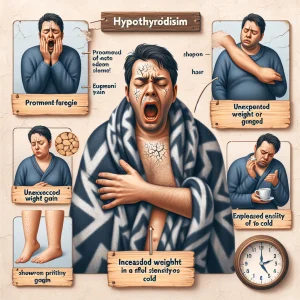Identify and Understand the Key Signs and Symptoms of Hypothyroidism for Better Health
Hypothyroidism is a crucial health issue that occurs when the thyroid gland fails to produce sufficient amounts of essential thyroid hormones. This small, butterfly-shaped gland located in the front of your neck is vital for regulating a wide range of bodily functions, particularly metabolism, energy levels, and overall health. When the thyroid is underactive, it triggers a series of physiological changes that can affect virtually every system in the body. The two primary hormones—thyroxine (T4) and triiodothyronine (T3)—are essential for maintaining a healthy metabolic rate. A reduction in their production often leads to a noticeable drop in energy, weight fluctuations, and a general decline in well-being. Recognizing these implications is vital for understanding the broad effects of this condition on your daily life.
A variety of factors can contribute to the development of hypothyroidism, including autoimmune disorders like Hashimoto’s thyroiditis, certain medications, previous radiation treatments, or even an iodine deficiency. Awareness of the risk factors and symptoms associated with hypothyroidism is crucial, as this condition can significantly impact your health and overall quality of life. Often described as the body’s “metabolic engine,” a decline in thyroid function can lead to metabolic disruptions that manifest as weight gain, chronic fatigue, and other troubling symptoms. It’s important to note that hypothyroidism is more prevalent in women and tends to increase with age. By being vigilant about these signs and symptoms, you can seek timely medical intervention and explore suitable treatment options.
Essential Information and Insights About Hypothyroidism You Need to Know
- Hypothyroidism is identified by insufficient hormone production from the thyroid gland, resulting in a variety of physical and psychological symptoms.
- Common signs of hypothyroidism include fatigue, weight gain, dry skin, and increased cold sensitivity, among others.
- Physical symptoms may also consist of hair loss, joint pain, and muscle weakness, which can severely affect daily activities and overall lifestyle.
- Emotional consequences can manifest as depression, anxiety, and difficulties in focus and concentration, potentially exacerbating existing mental health issues.
- Identifying hypothyroidism in children and adolescents can be particularly challenging, as they may exhibit signs like growth delays, delayed puberty, or academic struggles.
- Diagnosis typically requires blood tests that measure levels of thyroid hormones and thyroid-stimulating hormone (TSH).
- Standard treatment approaches for hypothyroidism usually include synthetic thyroid hormone medications designed to compensate for the hormone deficiency.
- Incorporating lifestyle changes such as a balanced diet, regular physical activity, effective stress management, and prioritizing sleep can significantly improve hypothyroidism management.
 Spot the Common Symptoms of Hypothyroidism in Your Everyday Life
Spot the Common Symptoms of Hypothyroidism in Your Everyday Life
As you engage in your daily routines, various symptoms may arise that could signify an underactive thyroid. One of the most frequently reported issues among individuals with hypothyroidism is a constant sense of fatigue. Many people experience overwhelming tiredness even after a full night’s rest, which can sap motivation and impede daily tasks. This chronic exhaustion not only affects your physical health but also disrupts emotional stability and overall productivity, leading to frustration and potential long-term health complications.
In addition to fatigue, unexpected weight gain is another common symptom. People often notice an increase in body weight despite adhering to a healthy diet and exercise routine. This frustrating weight gain typically stems from a slowed metabolism due to diminished thyroid hormone levels. Additional symptoms may encompass increased sensitivity to cold, dry skin, hair loss, and constipation. Recognizing these early warning signs is crucial, as it allows for timely medical intervention and effective management of the condition.
Delve into the Physical Symptoms Associated with Hypothyroidism
The physical symptoms of hypothyroidism can vary significantly and profoundly impact your daily life. One of the most common indicators is a noticeable decline in skin and hair quality. Many individuals report experiencing dry, rough, and flaky skin, which can lead to discomfort and self-esteem issues. Similarly, hair may become brittle and prone to falling out, raising concerns about personal appearance and further complicating mental health challenges.
Another physical symptom to be aware of is myxedema, characterized by swelling, particularly around the face and eyes. This condition results from the accumulation of mucopolysaccharides in the skin, leading to a puffy appearance that can be distressing. Muscle weakness and joint pain are also frequently reported by those diagnosed with hypothyroidism. Discomfort and stiffness in muscles and joints can limit participation in enjoyable activities. Therefore, identifying these physical signs is essential for understanding the broader implications of hypothyroidism on your overall health and quality of life.
Analyze the Emotional and Mental Health Impact of Hypothyroidism
Hypothyroidism significantly affects not only physical health but also emotional and mental well-being. Many individuals living with this condition frequently report feelings of depression or heightened anxiety that appear disproportionate to their circumstances. You may struggle with persistent sadness or a lack of motivation with no clear reason. If these emotions persist, they can become particularly concerning and indicative of the deeper effects of hypothyroidism on mental health.
Cognitive functions are also commonly impacted, with many individuals describing symptoms associated with “brain fog.” This cognitive decline can manifest as difficulties in concentration, forgetfulness, and an overall sensation of mental sluggishness. Such challenges can disrupt daily responsibilities, complicating tasks both at home and at work. Recognizing these emotional and cognitive symptoms linked to hypothyroidism is vital for obtaining the necessary support and treatment to improve your overall quality of life.
 Recognize Hypothyroidism Symptoms in Children and Adolescents
Recognize Hypothyroidism Symptoms in Children and Adolescents
Hypothyroidism does not solely affect adults; it can also have significant repercussions for children and adolescents, often presenting differently than in adults. In younger individuals, symptoms may not always be blatantly visible. For example, you might notice signs like growth delays or difficulties focusing in school. These symptoms can easily be misconstrued as typical childhood behavior or developmental delays, emphasizing the importance for parents and caregivers to remain vigilant and proactive.
In addition to growth-related concerns, children diagnosed with hypothyroidism may experience excessive fatigue or lethargy, which can impede their involvement in physical activities and social interactions with peers. Mood swings and irritability are also frequently observed, as hormonal imbalances can disrupt emotional stability. If you suspect your child exhibits symptoms indicative of hypothyroidism, consulting with a healthcare professional for a thorough evaluation and testing is essential to ensure their health and development are appropriately monitored.
Understand the Significance of Thyroid Function Tests for Diagnosing Hypothyroidism
The Vital Role of Thyroid Function Tests in Accurate Diagnosis
The journey to diagnosing hypothyroidism typically begins with thyroid function tests, which are critical for evaluating the health of your thyroid gland. The most commonly performed tests assess levels of Thyroid-Stimulating Hormone (TSH) and free thyroxine (T4). The pituitary gland produces TSH, which is essential for signaling the thyroid to produce T4. Elevated TSH levels may suggest that the thyroid is underactive and struggling to produce adequate hormones, indicating a potential case of hypothyroidism.
Understanding Thyroid Test Results for Accurate Diagnosis
At the same time, evaluating T4 levels is crucial for determining the severity of the hormonal deficiency. When blood test results show elevated TSH levels alongside low T4 levels, this combination typically confirms a diagnosis of hypothyroidism. Comprehending the complexities of these tests can help alleviate concerns and clarify your thyroid health, empowering you to take informed actions toward treatment.
Empower Yourself with Knowledge About the Diagnostic Process
Gaining a deeper understanding of the diagnostic process not only enhances your knowledge but also empowers you as you navigate your health journey. Being informed about the functioning of thyroid function tests and what they reveal about your body facilitates more effective discussions with your healthcare provider, enabling proactive management of your health and overall well-being.
 Explore Diverse Treatment Options for Effectively Managing Hypothyroidism
Explore Diverse Treatment Options for Effectively Managing Hypothyroidism
Upon receiving a diagnosis of hypothyroidism, various treatment options are available to help you manage the condition effectively. The most commonly adopted strategy is hormone replacement therapy, which generally involves the use of synthetic levothyroxine. This medication mimics the natural function of thyroid hormones, assisting in restoring normal hormone levels, alleviating symptoms, and enhancing overall well-being.
Your healthcare provider will collaborate with you to determine the appropriate dosage tailored to your specific needs and how your body responds to the treatment. Regular monitoring through blood tests is vital to ensure that your hormone levels remain within the desired range. Maintaining open communication with your healthcare team regarding any changes in your symptoms or potential side effects is crucial for optimizing your treatment experience and achieving the best possible health outcomes.
Implement Lifestyle Modifications for Optimal Hypothyroidism Management
Besides medication, adopting certain lifestyle changes can significantly improve your ability to manage hypothyroidism effectively. A well-rounded diet focused on whole foods can support thyroid function and overall health. Incorporating nutrient-rich foods rich in iodine, selenium, and zinc—such as fish, nuts, seeds, and leafy greens—provides essential nutrients necessary for optimal thyroid performance and hormone production.
Furthermore, participating in regular physical activity is crucial for maintaining a healthy weight and boosting energy levels. Moderate exercise can help combat fatigue, elevate mood, and enhance cognitive function, contributing to a comprehensive sense of well-being. Prioritizing good sleep hygiene is equally important; aiming for 7-9 hours of quality sleep each night is essential for supporting hormonal balance and overall health.
By thoroughly understanding hypothyroidism and its effects on both physical and emotional well-being, you empower yourself to take control of your health. With the right approach to diagnosis, ongoing management strategies, treatment options, and lifestyle changes, you can navigate this condition with assurance. Remember, you are not alone; seeking support from healthcare professionals and loved ones can greatly enhance your journey towards optimal health.
Frequently Asked Questions Regarding Hypothyroidism
What are the most prevalent symptoms associated with hypothyroidism?
Common symptoms linked to hypothyroidism include fatigue, weight gain, constipation, dry skin, hair loss, cold sensitivity, muscle weakness, and depression.
Can hypothyroidism cause changes in the menstrual cycle?
Yes, hypothyroidism can indeed lead to alterations in the menstrual cycle, which may present as irregular periods, heavy bleeding, or even missed periods.
Is hair loss a common symptom of hypothyroidism?
Hair loss is a frequent symptom of hypothyroidism, typically presenting as thinning hair, brittle strands, or noticeable bald patches.
Can hypothyroidism contribute to weight gain?
Yes, hypothyroidism can lead to weight gain due to a slowed metabolic rate and potential fluid retention in the body.
What mental health symptoms are associated with hypothyroidism?
Mental health symptoms related to hypothyroidism may encompass depression, anxiety, irritability, and challenges with concentration.
Can hypothyroidism cause muscle weakness?
Yes, individuals affected by hypothyroidism often experience muscle weakness and discomfort, which can hinder daily activities and exercise routines.
Is cold sensitivity a common symptom of hypothyroidism?
Yes, experiencing cold sensitivity is a typical symptom of hypothyroidism, often associated with a lower basal metabolic rate and reduced heat generation in the body.
Can hypothyroidism lead to dry skin?
Yes, hypothyroidism can result in dry and itchy skin due to decreased oil production and sweating, leading to discomfort and irritation.
Presented BY: Hypothyroid Blood Tests
Hypothyroidism Symptoms: Key Signs to Recognise Was First Published By https://bloodtest.co.uk
Find Us On Facebook: EZ Blood Tests
The Article: Hypothyroidism Symptoms: Essential Signs to Identify appeared first on: https://ezbloodtest.com
The Article Hypothyroidism Symptoms: Key Signs You Should Recognize Was Found On https://limitsofstrategy.com
The Article Hypothyroidism Symptoms: Essential Signs to Identify First Appeared ON
: https://ad4sc.com


Your insights into hypothyroidism and its systemic effects on health highlight a critical yet often overlooked aspect of bodily function. It strikes me how often the thyroid gland, despite its small size, influences our lives in such significant ways. I’ve experienced this firsthand; after several years of unexplained fatigue and weight fluctuations, I finally connected those symptoms to a diagnosis of hypothyroidism. The realization that something as seemingly minor as a hormonal imbalance could affect my energy levels, mood, and overall health was both enlightening and alarming.